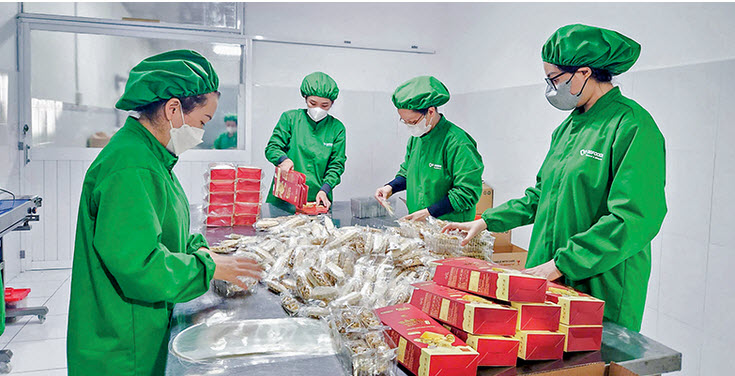
Mounting Challenges
In 2024, the Mekong Delta’s economy continued its positive growth trajectory, with the region’s GRDP reaching 7.3%, surpassing the 6.6% recorded in 2023 and exceeding the national average of 7.1%. Notably, import-export activities remained a key growth driver. The region’s total import-export turnover hit USD 41.96 billion in 2024, up 17.45% from the previous year. Tien Giang, Long An, Dong Thap, and Can Tho recorded significant trade surpluses. The MD contributed up to 57% of the national trade surplus value, reflecting its importance to Vietnam's international trade revenue.
However, challenges remain, especially in attracting foreign direct investment (FDI). The region saw only 142 new FDI projects in 2024 with a total registered capital of USD 628 million, accounting for just 4.2% of projects and 3.2% of FDI capital nationwide. The private business sector is also under pressure. Despite a 12% increase in newly established businesses, they still represent only 8% of the national total. Regarding registered capital, the figure accounts for just 6.7% of the country’s total. Alarmingly, the number of businesses suspending operations or dissolving remains high, reflecting mounting pressure on the private sector,” said Mr. Vo Tan Thanh, Vice President of the Vietnam Chamber of Commerce and Industry (VCCI). “These figures are a serious warning that both public and private sectors must act swiftly, decisively, and cohesively to support enterprises through these tough times.”
A 2025 VCCI MD survey revealed that most enterprises anticipate significant challenges: 68.8% are concerned about inflation and rising production costs, 57.1% expect weakened domestic consumption, and 54.5% predict declining export markets. Other worries include the intensifying impacts of climate change, limited access to land and business locations, substandard transport infrastructure raising costs and reducing product quality, and saline intrusion and flooding threatening raw material areas.
Opportunity Amid Crisis
At the 2025 annual Mekong Delta Business Conference, themed "Adapting to Global Trade Challenges – Opportunities and New Directions for MD Enterprises", hosted by VCCI MD, Mr. Vo Tan Thanh emphasized: “In the face of widespread difficulties, MD enterprises must remain agile, seize opportunities, and develop fitting strategies. With this year’s theme, we aim to deliver practical insights, identify global trade trends, and accompany businesses in restructuring supply chains, enhancing competitiveness, and accessing sustainable markets. As Vietnam undergoes sweeping institutional and administrative reforms, a new foundation is laid for stronger business development. We firmly believe that every crisis presents an opportunity. If enterprises can leverage domestic reforms and global trends, Vietnam’s economy, particularly the MD, can enter a breakthrough development phase.”
According to Ms. Nguyen Thi Thuong Linh, Deputy Director of VCCI MD, in 2025, businesses are showing greater interest in improved business environments, trade promotion, and capacity-building support such as training and consulting. VCCI MD's support efforts will focus on delivering practical regional information, facilitating policy planning and adjustment, and serving as a bridge to communicate the realities and needs of the region’s business community to the Government and local authorities. It will also advocate for a more enabling business environment and foster enterprise growth by strengthening management and competitiveness in the new context.
Regarding policy-related support, VCCI MD plans to establish a legal advisory club for enterprises, coordinate with localities to organize policy workshops, and provide essential regulatory updates to businesses. For business environment improvements, efforts include consulting with and assisting localities in improving DDCI and PCI indexes; proposing and connecting investment funds and socio-economic development projects. Business support activities will focus on capacity building (training, data provision), business networking (organizing trade and investment promotion conferences, direct match-making), and market expansion (market intelligence and international and domestic trade missions).
To ensure trade remains a regional growth engine, Mr. Vu Ba Phu, Director General of the Vietnam Trade Promotion Agency (Ministry of Industry and Trade), noted: “Although the U.S. has yet to implement specific reciprocal tariff measures targeting Vietnam, risks are real as Vietnam rises to become a global production hub. The origin of goods, especially from third countries, becomes a focal point in reciprocal tax negotiations. Vietnam and ASEAN may need to negotiate jointly with the U.S. to enhance bargaining power and achieve favorable tariff outcomes. Preventive actions, early preparations for negotiations, and proactive adaptation are essential to protect enterprises and maintain FDI-driven supply chains, while minimizing post-negotiation complications with major partners like China, the EU, and Japan.”
A Long-Term Vision
Many experts suggest that Vietnam and the MD must diversify export markets and enhance regional and global cooperation to avoid over-dependence on any single market. It is also essential to re-evaluate tax revenue impacts, technology transfers, and environmental effects of multinational corporations operating in Vietnam to attract high-quality, selective FDI. At the same time, local economic sustainability must be built through investments in infrastructure, local workforce training, natural resource restoration, and community engagement to create a resilient economy capable of withstanding external shocks.
Source: Cantho News - Translated by Hoang Dat














